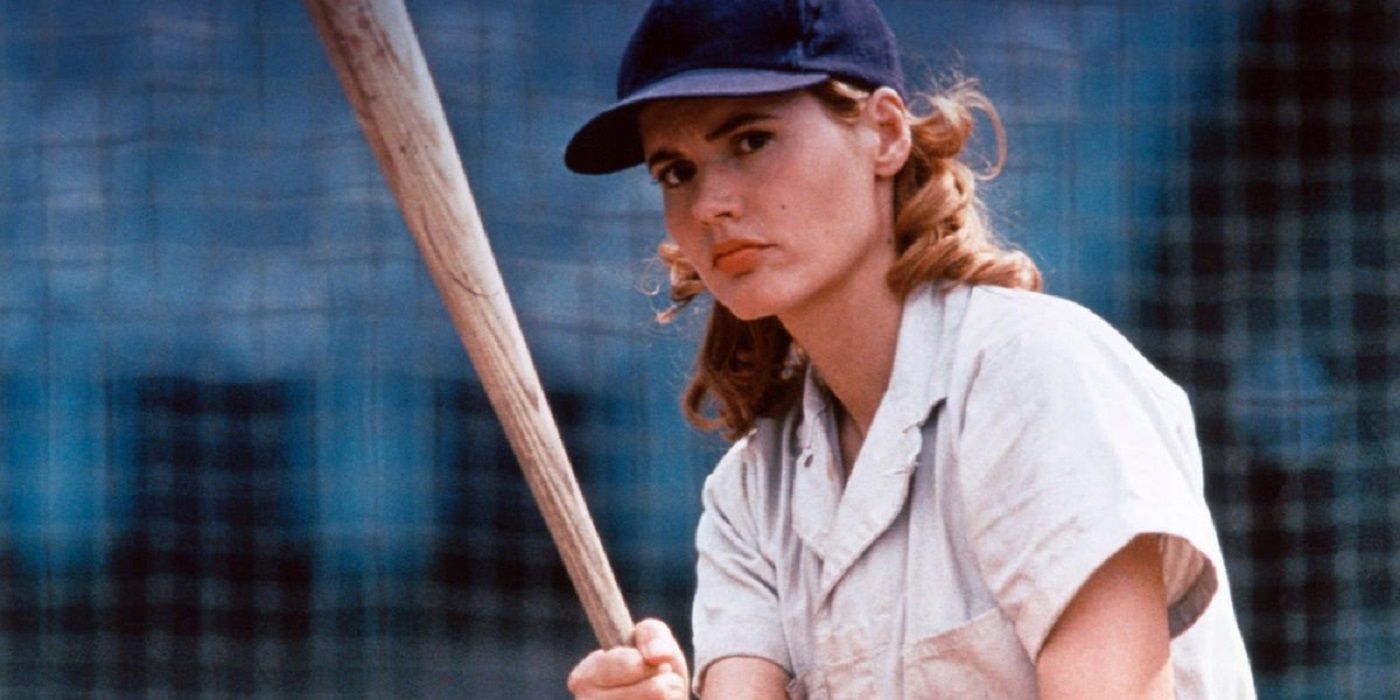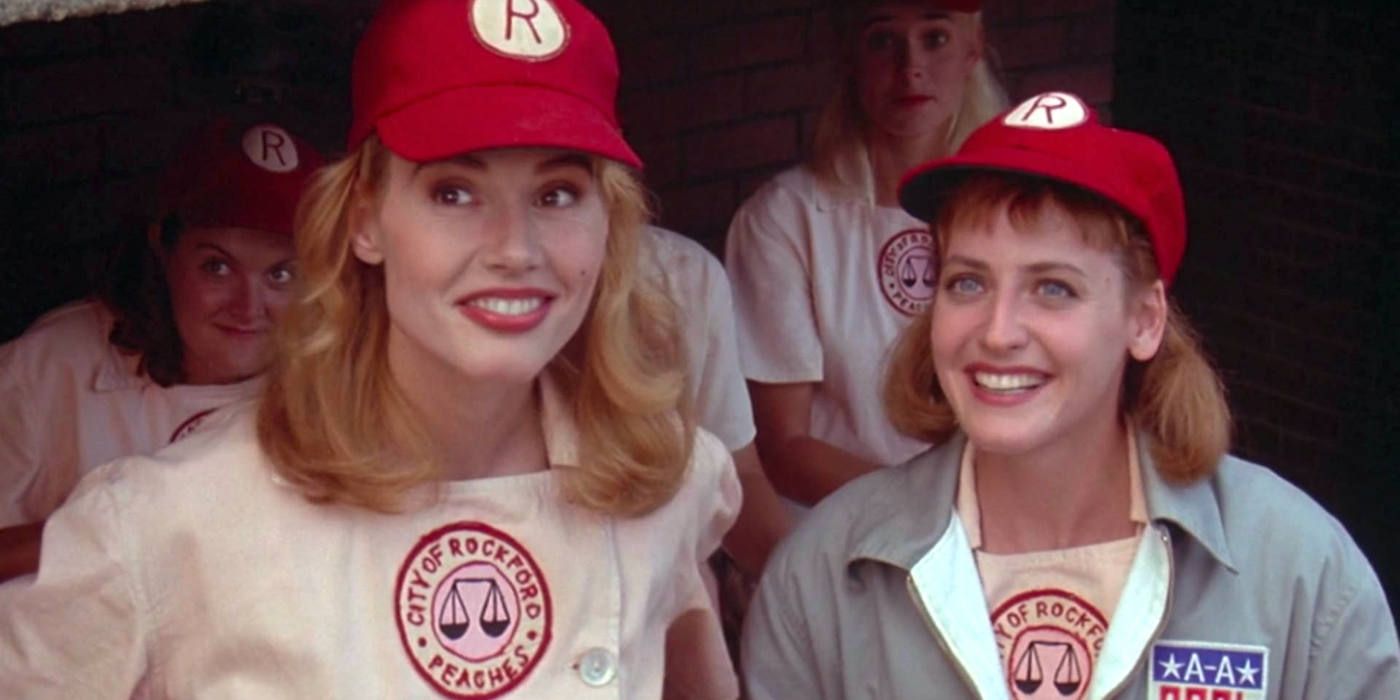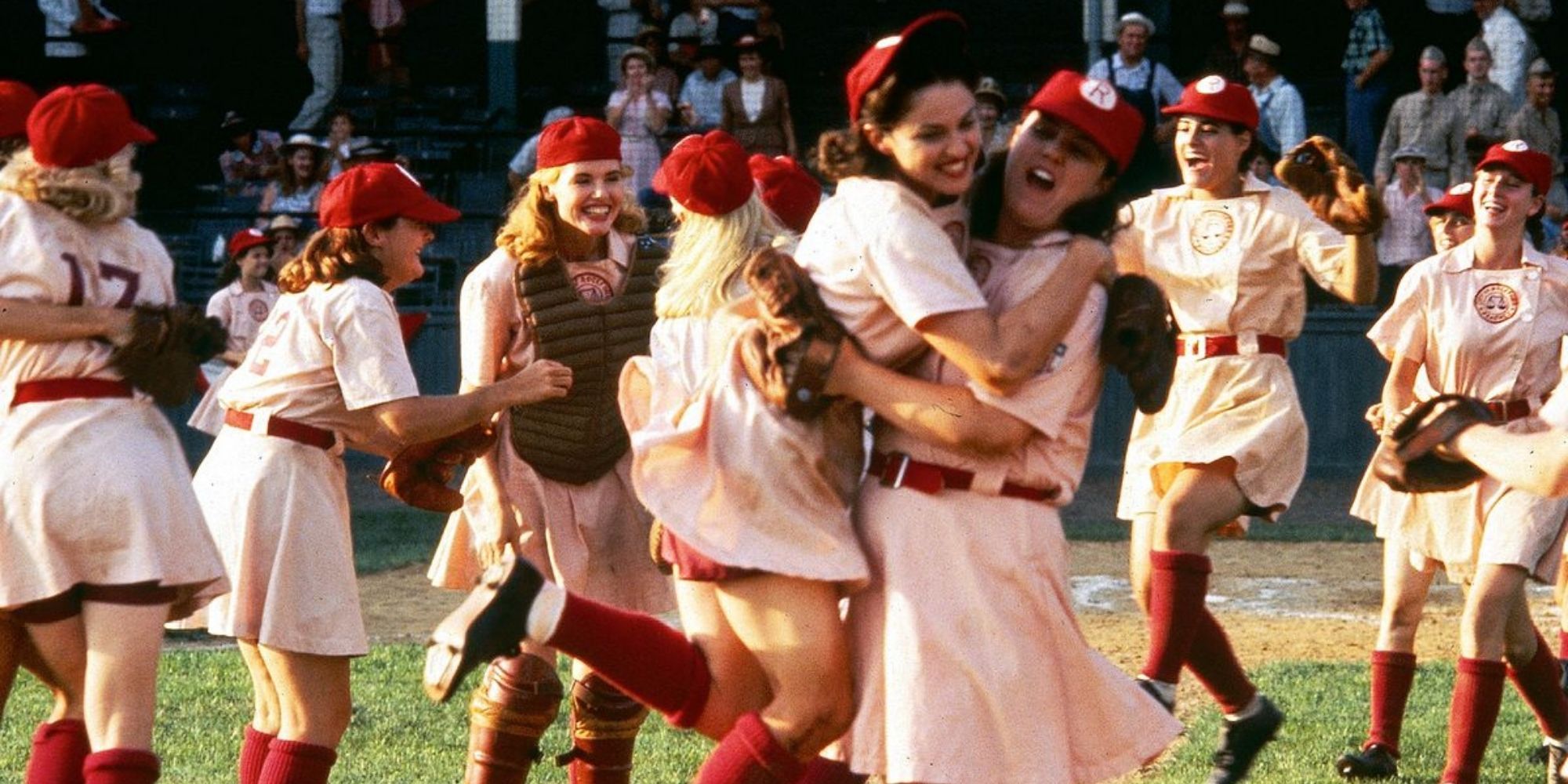Even if you haven’t seen A League of Their Own, you’ve likely heard Tom Hanks crankily bark those famous few words: “There’s no crying! There’s no crying in baseball!” That line, though instrumental to the sports classic and rightfully iconic, casts a sillier shadow over a film that’s steeped in heart, history, and hope. It’s far more than a sports movie. It’s a powerful story about the fragility of life, serving as a playful reminder to take risks and appreciate the people in your corner.
Penny Marshall, a household name thanks to her work as an actor in a trio of television juggernauts known as Happy Days, The Odd Couple, and Laverne & Shirley, seamlessly brings her keen eye for storytelling to the director’s chair. One of the reasons why Marshall was a shoo-in to direct the beautiful movie is because of her impressive ability to take on both comedy and drama. A few years earlier, she directed Hanks in the whimsical comedy Big and then Robert De Niro and Robin Williams in the medical drama Awakenings, both of which were nominated for Oscars.
At the core of A League of Their Own is the close but damaged relationship between Dottie (Geena Davis) and Kit (Lori Petty), two sisters living in 1943 Oregon who work at a dairy farm and happen to be damn good at playing baseball. They love the sport equally, but have different aspirations. Dottie, an expert catcher and all-around ballplayer, seems to have it all. She’s beautiful, composed, and hopeful that her husband will return safe from the war so they can start a family. Kit, on the other hand, wants to make a name for herself somewhere and is constantly being reminded of how she pales in comparison to her sister. She’s a sucker for the “high-ones” that come sailing over the plate (which she more often than not misses) and is often bailed out by Dottie, the superior player. Dottie always tries to build Kit up, but Kit never lets her. Instead, Dottie patiently listens to her little sister lament about her blunders and what hecklers said to her after the game: “Kit, why don’t you get your sister to teach you to hit?”
While Kit and Dottie milk cows, they get an unexpected visit from Ernie Capadino (Jon Lovitz), a persnickety baseball scout looking to recruit players for the upcoming experiment known as the All-American Girls Professional Baseball League. At this time, the country is smack-dab in the middle of World War II, and all the Major League Baseball players are being whisked off to fight on the front lines. No players means no baseball, which to investors, means no money. In an effort to keep the game going and people’s pockets full, Ira Lowenstein (the promotional expert to Walter Harvey, the league’s founder in the film) is tasked with figuring out how to keep the sport alive. Scouts are sent out across the country to search for the best—and prettiest—female players who could form a league of their own. If Dottie was willing to try out in Chicago, then heck, Kit could come along, too.
As is the case with most films where the cast fits like a glove (caution: baseball puns are here to stay), it’s hard to imagine anyone else in their respective roles. Geena Davis and Lori Petty’s chemistry as sisters is undeniable. (Debra Winger and Demi Moore were both options for the role of Dottie.) Davis carries Dottie’s maturity and complexity with ease, while Petty humorously leans into Kit’s childlike frustrations and tiny tantrums. The sisters unsurprisingly make the league and join the Rockford Peaches alongside a bevy of lovable characters. Pop star Madonna nailed the role of Mae “All the Way” Mordabito, a flirtatious center fielder who always has her eyes on the male fanbase, and her tough, unfiltered friend Doris Murphy is smartly played by Rosie O’Donnell. Megan Cavanagh shines as the homely and painfully shy second baseman Marla Hooch, who has one of the most satisfying character arcs in the film.
Leading the team (well, “leading” is quite generous) is Hanks’ Jimmy Dugan, a jaded former baseball player who is simply taking this manager position for the booze money. While Dugan might be phoning it in, Hanks’ performance could not be more impressive. The scene when he first greets his team by drunkenly stumbling through their locker room to relieve himself for a deeply troubling amount of time is unrivaled. He’s sure to cushion this persistent brash behavior (hocking tobacco and failing to learn anyone’s name) with moments of sincere affection and gratitude, resulting in a character we not only root for, but deeply care for. I think this Hanks fella is going places.
As the men were fighting Hitler on the battlefield, the women were fighting misogyny on the home front. To many, women having a league of their own was a truly baffling concept, and the movie creatively and effectively addresses the genuine panic that permeated the era. If women left the kitchen, how was society supposed to function? Who would raise the children? Could women—gasp—lose their femininity? Not only does A League of Their Own put an entertaining and educational spin on a narrow-minded chapter of our country’s history, it is sure to emphasize the positives that came from it as well. Getting “dirt in the skirt” (sliding into the base) was seen as a badge of honor. Husbands proudly yelled “that's my wife!” when their spouse had a particularly impressive moment on the field. Instead of shouting about a beautiful “Diamond Gal,” people were shouting about a beautiful catch one of them made. In other words, being told you “threw like a girl” was officially a compliment.
There are many delightful subtleties and details that contribute to the film’s big heart, but what’s especially powerful is the way the story is executed. The movie is book-ended by Dottie’s present-day life in 1988, roughly 40 years after her glory days behind home plate. Before we travel back to the 1940s where the majority of the film takes place, we meet the much-older Dottie, who’s on the fence about whether or not she should attend a team reunion. Carole King’s “Now and Forever” that plays in the beginning indicates that the team surely meant a lot to Dottie, even though she was apprehensive to attend the event. But the fade to flashback for the bulk of the film is a bold decision with an enormous payoff. It strategically creates a more immersive experience for the audience and turns the final scene at the Baseball Hall of Fame—where we see the Peaches past their prime reunite all these years later—into an emotional gut-punch.
A League of Their Own will stay with you long after Madonna’s “This Used to Be My Playground” aptly plays over the credits. Aside from making you wonder if a certain someone intentionally dropped that ball in Game 7 of the World Series, it’ll remind you to relish each fleeting moment and appreciate those who appreciate you. There may be no crying in baseball, but this picture is sure to leave you in tears.
Rating: A



